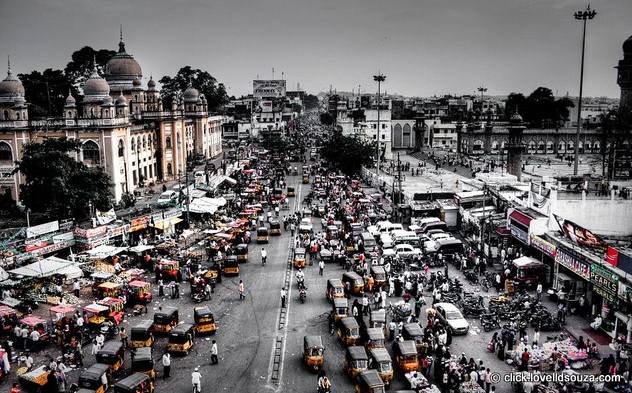
By Sunish Jauhari
Road accidents have become the leading cause of death for young people between the ages of 15 and 29, a worrying problem given that 1.2 million people die every year in road accidents, nearly half of them vulnerable road users: pedestrians, and people on motorized and non-motorized two wheelers, according to the World Health Organization. Road safety requires better infrastructure and more effective law-enforcement, but failing to address human behavior at the same time will render these measures potentially ineffective.
What makes road safety such a complex issue, and the role of human behavior so powerful? There is a fascinating correlation between higher levels of inequality in societies, and countries with worst number of road crashes, deaths and injuries, like India.
Prosperity, shared space and inequality
Countries that rate highest for overall “happiness,” according to Legatum Institute’s Prosperity Index (based on various parameters including economy, health, safety and security, and personal freedom) have less inequality and large shared spaces – spaces where haves and have-nots co-exist and the use of a space is not a function of one’s socio-economic class.
What I find interesting is how the spaces people share, and the extent of inequality, are correlated. The top-rated countries in the happiness index, like Norway, Finland, Canada, and Switzerland, are the countries with fewer economic classes—or in other words, much less economic inequality.
Countries like South Africa, India, and Egypt feature in the mid-low rank, below 70, on this index, India being 104th, having constantly declined for the last four years in a row. Lower-ranked countries like India and Egypt, while having a better pace of economic development, tend to have much higher inequality (a greater number of economic classes) and far less shared space than those at the top of the prosperity index.
Inequality exacerbates low levels of interpersonal interaction, and people who have more social power tend to give little attention to those with less social power, according to noted psychologist Daniel Goleman, author of Emotional Intelligence and The Great Divide series in the New York Times blog. There is evidence that one economic class of people cannot naturally empathize with another.
Roads are the only places where people from all the economic classes are forced to share space. An inability to understand people from other economic classes, their struggles, pains, and priorities, makes people behave irresponsibly on the roads.
Mutual respect disappears. Moreover, poor roads and the growing number of vehicles snowball this situation into further chaos, increasing the risk of traffic violation and road rage.
Empathy in shared spaces
All this suggests that empathy will be a key ingredient in creating safer roads by 2020. There surely is a need for a fresh perspective towards road safety, and the work of several social entrepreneurs proves that it is possible to build the skill of empathy—and that it is an effective solution to some of the most nagging problems.
Ashoka Fellow Mary Gordon’s award-winning efforts to introduce empathy as a skill in early childhood proves that children can develop pro-social behaviour, which helps overcome the massive issue of bullying in Canada and many other countries. There may be good potential in this approach to raise a generation of more tolerant and empathetic children.
In India, Ashoka Fellow Jasmeen Patheja demonstrates yet another, but related, aspect of inclusion. Her phenomenal campaign breaks stereotypes with communities like truckers in India with respect to women’s safety.
Ashoka Fellow Solomon Prakash’s mGaadi focuses on rickshaw-drivers’ livelihood and insurance, making auto rickshaws work better in India. They could be unusual allies that we have often overlooked! So does this mean that rag-pickers associations or auto rickshaw unions will be those unusual allies in a new approach to road safety?
Empathy surfaces at the core of all these examples, and many more such interventions have proven successful around the world. Empathy has potential to reduce road deaths too.
Countries with worst number of road crashes, deaths and injuries, like India, are afflicted with inequality and hence lack of empathy. For example, India is a society that thrives on competition in every aspect of life so that people are naturally intolerant. Citizen sector organization, policymakers, and law keepers need to incentivize (although not literally) tolerance and pro-social behaviour, making empathy the centerpiece of their programs.
Creating more opportunity for different segments of population to share spaces is a great start for lasting results. This needs to happen widely. Unless there are more mixed-segment housing projects, efficient and affordable public transport options, better pathways and boulevards, and open parks that allow concerts and community programs to take place, it is unlikely that we will be able to develop empathy and tolerance that seems to be key towards saving lives.
But if we do achieve some of this, it will be a step toward lasting change. That is why UL and Ashoka have partnered to launch Safer Roads, Safer India: Gamechanging Innovations that Save Lives, a challenge that is building a network to integrate innovative cultural, technological, social, and governance solutions for safer roads. Six prizes of INR 300,000 each will be awarded, including one special focus prize awarded to solutions that apply to Bangalore.
Follow #saferoads on Twitter for updates on latest on innovation trends, and join the Facebook group to become part of the conversation!
Author Bio: Sunish Jauhari is an institutional strategist who leads the road safety initiative at Ashoka India. He has worked extensively with small and medium scale enterprises in the UK and in India on market-entry and distribution strategies in the technology sector.





























If people don’t care, there won’t be any change.
People, anywhere around the world, need to care to create change that will be lasting and sustainable and widespread.
All the best Ashoka!